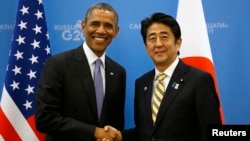U.S. President Barack Obama is pledging to complete a new Trans-Pacific trade agreement this year, even as roadblocks remain in forging a 12-nation pact.
The American leader met Thursday with Japanese Prime Minister Shinzo Abe on the sidelines of the G20 Summit in St. Petersburg, Russia. While most of the headlines from the summit concern Washington's effort to rally international support for a military strike on Syria, the leaders are also discussing economic concerns.
Obama said at his meeting with Abe that the Trans-Pacific Partnership would open markets in the rapidly developing region.
"I know that Prime Minister Abe is committed, as we are, to completing this year negotiations around the Trans-Pacific partnership," he remarked, "which promises to open up markets and create the kind of high standards and trade agreements throughout the largest and most dynamic and fastest growing set of markets in the world."
Whether the trade deal is completed by the end of the year is an open question.
It would be the largest free trade agreement in U.S. history, but nine days of negotiations in Brunei ended inconclusively in the last week. New talks are set for Washington in mid-September, with some key stumbling blocks related to U.S. efforts to protect its large pharmaceutical industry and Japan's concern about tariffs on farm products.
Abe said several economic stimulus measures he has initiated have set a "stable foundation" for advancing the long-stagnant Japanese economy.
The U.S. and Japan are, respectively, the largest and third largest economies in the world. But as the U.S. weighs a curb on its economic stimulus measures, developing countries fear their own fortunes could deteriorate.
The two-day meeting in St. Petersburg is meant to focus on jobs and global economic growth, helping economies stay afloat as interest rates increase in the United States. The fear of tightening U.S. monetary policies could weaken the economies of such G20 members as Brazil, India, Indonesia, Turkey, and South Africa.
The leaders of some of those nations want to ensure that the United States coordinates with other nations if it revises its financial policies. Policy makers at the U.S. central bank, the Federal Reserve, are set to consider in mid-September whether to cut its purchase of securities, a stimulus measure it has used to boost the U.S. recovery from the 2009 recession.
The American leader met Thursday with Japanese Prime Minister Shinzo Abe on the sidelines of the G20 Summit in St. Petersburg, Russia. While most of the headlines from the summit concern Washington's effort to rally international support for a military strike on Syria, the leaders are also discussing economic concerns.
Obama said at his meeting with Abe that the Trans-Pacific Partnership would open markets in the rapidly developing region.
"I know that Prime Minister Abe is committed, as we are, to completing this year negotiations around the Trans-Pacific partnership," he remarked, "which promises to open up markets and create the kind of high standards and trade agreements throughout the largest and most dynamic and fastest growing set of markets in the world."
Whether the trade deal is completed by the end of the year is an open question.
It would be the largest free trade agreement in U.S. history, but nine days of negotiations in Brunei ended inconclusively in the last week. New talks are set for Washington in mid-September, with some key stumbling blocks related to U.S. efforts to protect its large pharmaceutical industry and Japan's concern about tariffs on farm products.
Abe said several economic stimulus measures he has initiated have set a "stable foundation" for advancing the long-stagnant Japanese economy.
The U.S. and Japan are, respectively, the largest and third largest economies in the world. But as the U.S. weighs a curb on its economic stimulus measures, developing countries fear their own fortunes could deteriorate.
The two-day meeting in St. Petersburg is meant to focus on jobs and global economic growth, helping economies stay afloat as interest rates increase in the United States. The fear of tightening U.S. monetary policies could weaken the economies of such G20 members as Brazil, India, Indonesia, Turkey, and South Africa.
The leaders of some of those nations want to ensure that the United States coordinates with other nations if it revises its financial policies. Policy makers at the U.S. central bank, the Federal Reserve, are set to consider in mid-September whether to cut its purchase of securities, a stimulus measure it has used to boost the U.S. recovery from the 2009 recession.













